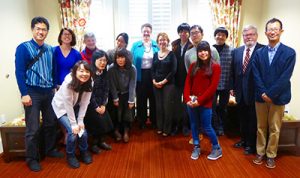A group of students from Kobe University in Japan visited the University during the first week of February. The seven students, both undergraduate and graduate, and their faculty mentor spent a week with School of Education faculty and local school sites to see various educational structures and learn about disability studies and inclusive education from elementary grades through higher education. Also, several days were spent on lesson study activities.
 Jugyo kenkyu, or lesson study, is a form of long-term professional development in which teachers conduct collaborative classroom research to study their lesson instructions in order to determine how students understand best. Its origins can be traced back to Japanese elementary education. Lesson study is considered to be a powerful transformation tool for students, because it concentrates on improving teaching methods to suit student learning.
Jugyo kenkyu, or lesson study, is a form of long-term professional development in which teachers conduct collaborative classroom research to study their lesson instructions in order to determine how students understand best. Its origins can be traced back to Japanese elementary education. Lesson study is considered to be a powerful transformation tool for students, because it concentrates on improving teaching methods to suit student learning.
During their visit, the Japanese students celebrated Setsubun, a Japanese festival, on Feb. 3. It is also called the bean-throwing festival because it is believed that wandering spirits come close to the physical world around that time and the Japanese people throw beans to drive them away.
The Japanese visitors were also in Syracuse to visit Kazushige Akagi, associate professor at Kobe University. Akagi has been in Syracuse since March 2015 to study the style adopted by Americans in lesson study. He has been working with Sharon Dotger, associate professor in teaching and leadership in the School of Education and chair of the department of Science Teaching in the College of Arts and Sciences, who focuses on how learning is related to teaching. She collaborates with elementary teachers to conduct research and study about how students think about science, and has open research classes on campus every year. Dotger and Akagi make collaborative visits to local elementary schools as part of their study.
“I came here to learn about lesson study and inclusive education,” says Akagi. “I am surprised to see that Americans concentrate on a child’s learning ability, while in Japan we study the same with concentration on a teacher’s instruction and teaching ability.” Akagi feels another difference has been teachers’ participation in lesson study. He feels while all teachers participate in lesson study in Japan as a weekly exercise, it is not so in the United States.
The Japanese students had a hectic schedule over the one-week period. They attended seminars and events on lesson study, and met many groups of Syracuse faculty and staff. They visited elementary schools in Syracuse to see how children with disabilities are included in regular classes.
“We wanted to explore the American education system with respect to disability studies,” says Yuki Shinohara, a graduate student studying psychology, at Kobe University.
“I work in disability service in a nonprofit organization,” says Ikumi Fukagawa, another graduate student, “and I am curious to see how such students are being taught in the United States.”
The Japanese students were excited about an exchange program with Syracuse University in the future, or even a short summer course. They felt the experience would give them an opportunity to explore a different place and culture, while learning about children with disability and understanding inclusive education, a subject they care about the most.
